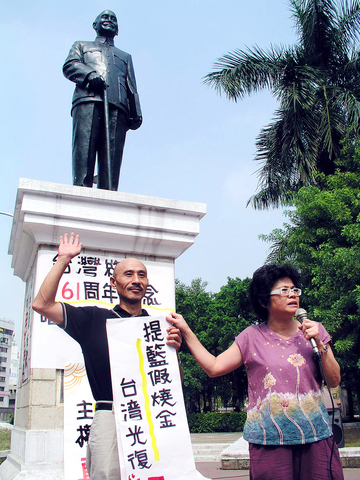A throng of pro-China demonstrators gathered outside the Ministry of the Interior yesterday to demand that the government designate Retrocession Day as a national holiday.
Retrocession Day celebrates the end of the Japanese colonial period in Taiwan on Oct. 25, 1945, as well as the conclusion of the Sino-Japanese War (1937-1945), and is observed by Chinese worldwide.
"We need to remind the government of the importance of Retrocession Day -- of the more than 30 million Chinese who died at the hands of the Japanese military in China, and of the many who suffered under Japanese colonial rule here in Taiwan," said Tang Shu (

PHOTO: YU HSUEH-LAN, TAIPEI TIMES
Retrocession Day used to be a national holiday, but has not been observed since 2001 as the government has instead pushed for two-day weekends.
Luo Su-chuan (
Maggie Cheng (
"But we're not associated with the current anti-President Chen Shui-bian [陳水扁] campaign," Cheng added, despite the fact that numerous protesters wore "Depose Chen" baseball caps.
Shu, meanwhile, denounced Chen for not enshrining a holiday that was important to ethnic Chinese, adding that the US was pitting the Taiwanese and Chinese against each other to maintain its own hegemonic interests and a lucrative trade in weapons to Taiwan.
"The Americans don't like symbols of cross-strait unification such as Retrocession Day because they need to promote cross-strait enmity in order to sell their weapons," Tang said.
Tang added that although China has deployed more than 800 ballistic missiles on the east coast, "very few of the missiles actually target Taiwan."
Although the US was frustrated with a long-stalled arms package in the Legislative Yuan, US arms dealers were scrambling to sell other weapons to the country, Tang said.
Meanwhile, on a related issue, the Taiwan Society last night held an indoor rally in Kaohsiung to expand the "local culture movement," an event that the organizer hoped would counter the "misconceptions" about local culture and national identity created by the Chinese Nationalist Party's (KMT) "colonial culture" in the post-World War II period.
Yang Wen-chia (

Taiwan is stepping up plans to create self-sufficient supply chains for combat drones and increase foreign orders from the US to counter China’s numerical superiority, a defense official said on Saturday. Commenting on condition of anonymity, the official said the nation’s armed forces are in agreement with US Admiral Samuel Paparo’s assessment that Taiwan’s military must be prepared to turn the nation’s waters into a “hellscape” for the Chinese People’s Liberation Army (PLA). Paparo, the commander of the US Indo-Pacific Command, reiterated the concept during a Congressional hearing in Washington on Wednesday. He first coined the term in a security conference last

A magnitude 4.3 earthquake struck eastern Taiwan's Hualien County at 8:31am today, according to the Central Weather Administration (CWA). The epicenter of the temblor was located in Hualien County, about 70.3 kilometers south southwest of Hualien County Hall, at a depth of 23.2km, according to the administration. There were no immediate reports of damage resulting from the quake. The earthquake's intensity, which gauges the actual effect of a temblor, was highest in Taitung County, where it measured 3 on Taiwan's 7-tier intensity scale. The quake also measured an intensity of 2 in Hualien and Nantou counties, the CWA said.

The Overseas Community Affairs Council (OCAC) yesterday announced a fundraising campaign to support survivors of the magnitude 7.7 earthquake that struck Myanmar on March 28, with two prayer events scheduled in Taipei and Taichung later this week. “While initial rescue operations have concluded [in Myanmar], many survivors are now facing increasingly difficult living conditions,” OCAC Minister Hsu Chia-ching (徐佳青) told a news conference in Taipei. The fundraising campaign, which runs through May 31, is focused on supporting the reconstruction of damaged overseas compatriot schools, assisting students from Myanmar in Taiwan, and providing essential items, such as drinking water, food and medical supplies,

Prosecutors today declined to say who was questioned regarding alleged forgery on petitions to recall Democratic Progressive Party (DPP) legislators, after Chinese-language media earlier reported that members of the Chinese Nationalist Party (KMT) Youth League were brought in for questioning. The Ministry of Justice Investigation Bureau confirmed that two people had been questioned, but did not disclose any further information about the ongoing investigation. KMT Youth League members Lee Hsiao-liang (李孝亮) and Liu Szu-yin (劉思吟) — who are leading the effort to recall DPP caucus chief executive Rosalia Wu (吳思瑤) and Legislator Wu Pei-yi (吳沛憶) — both posted on Facebook saying: “I